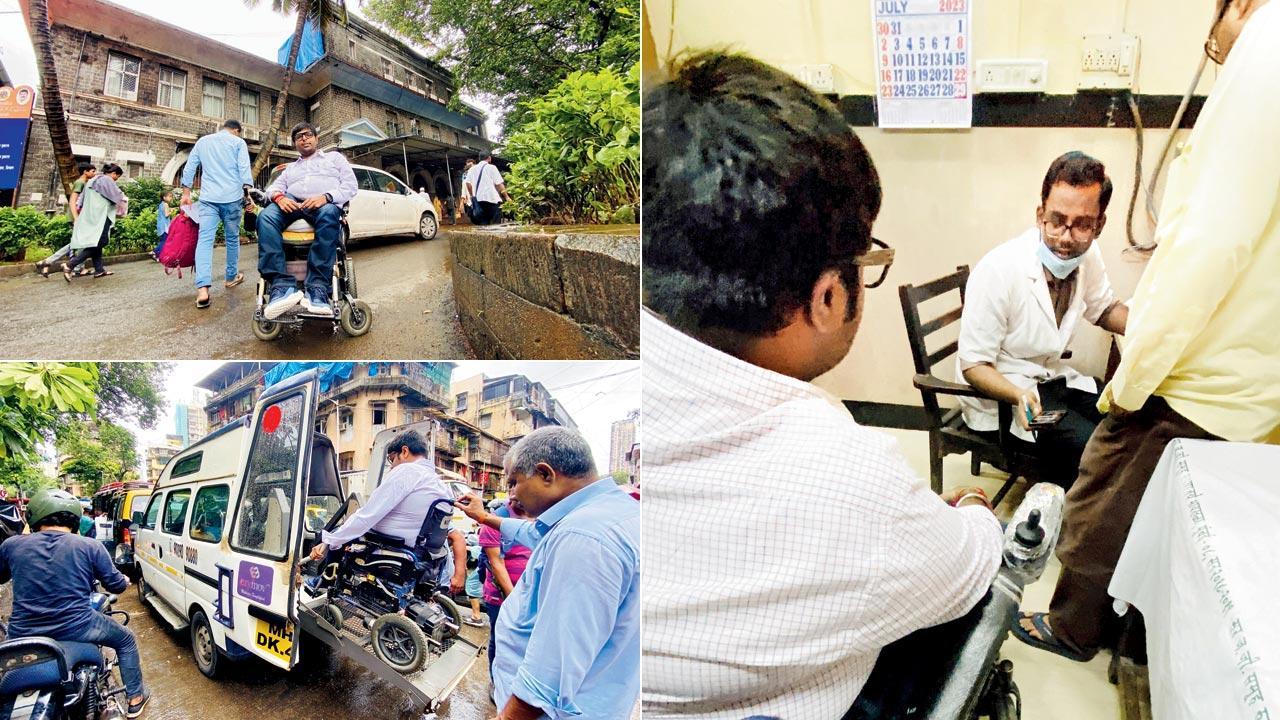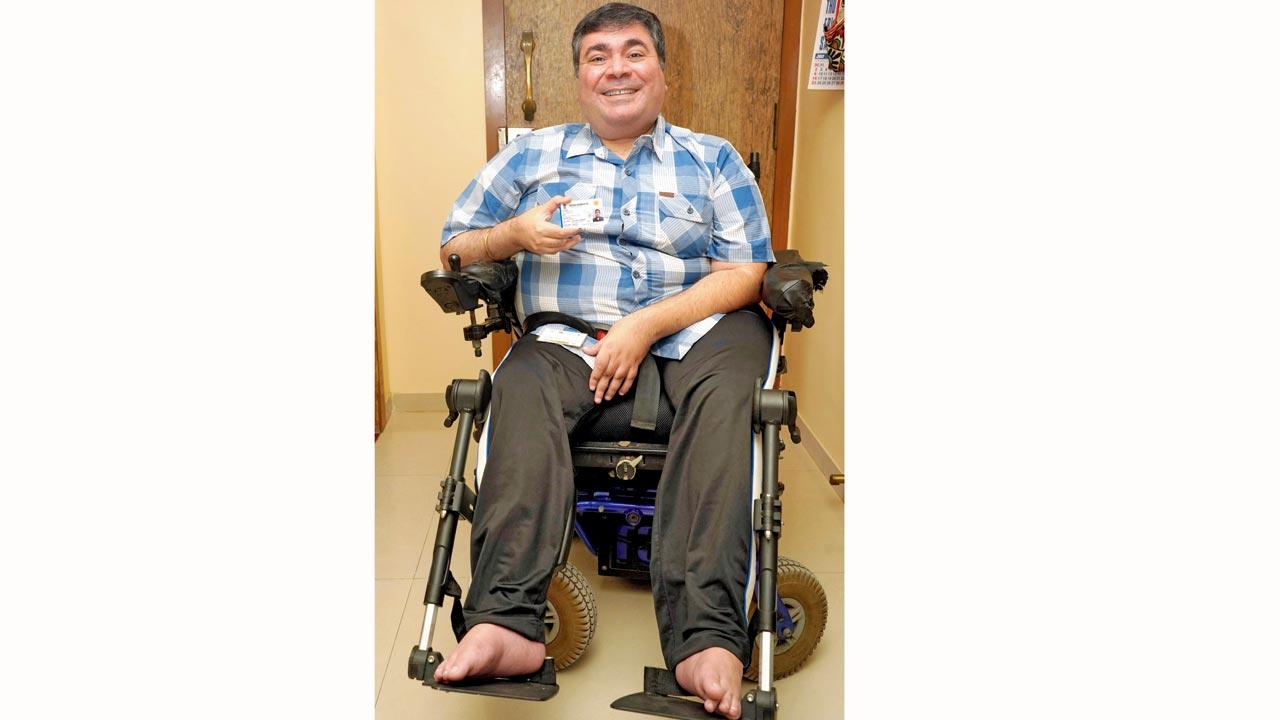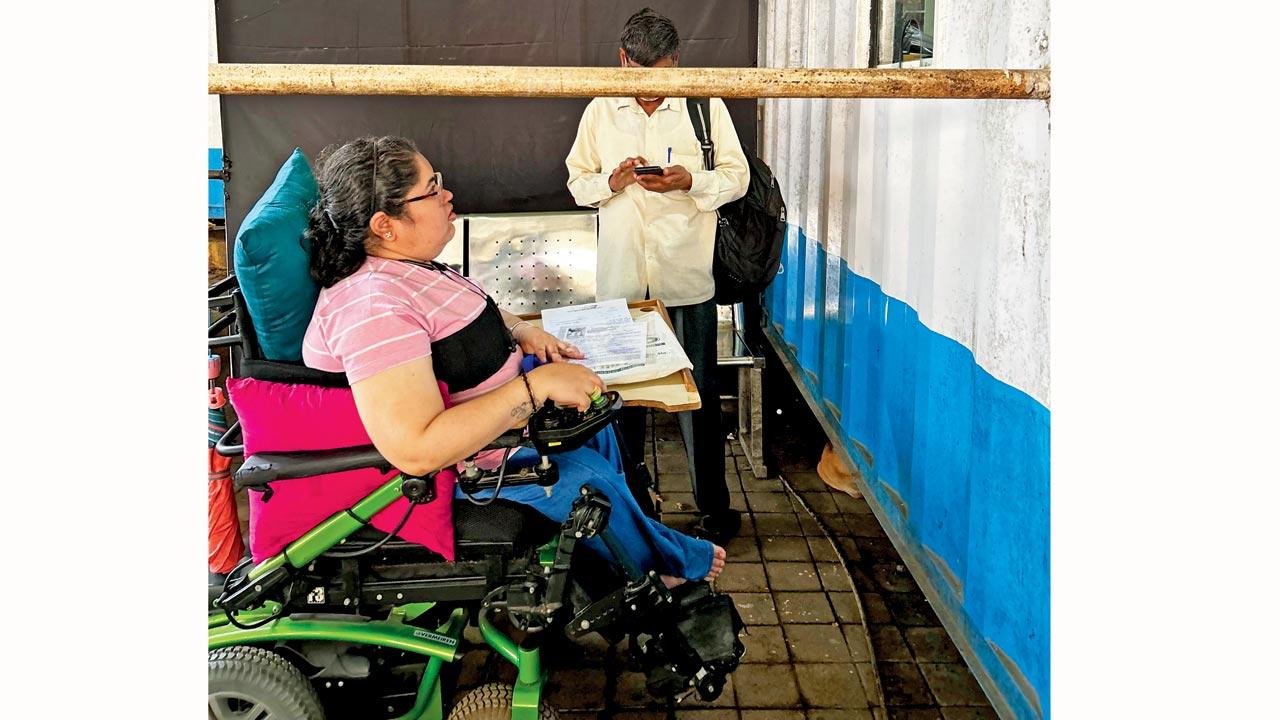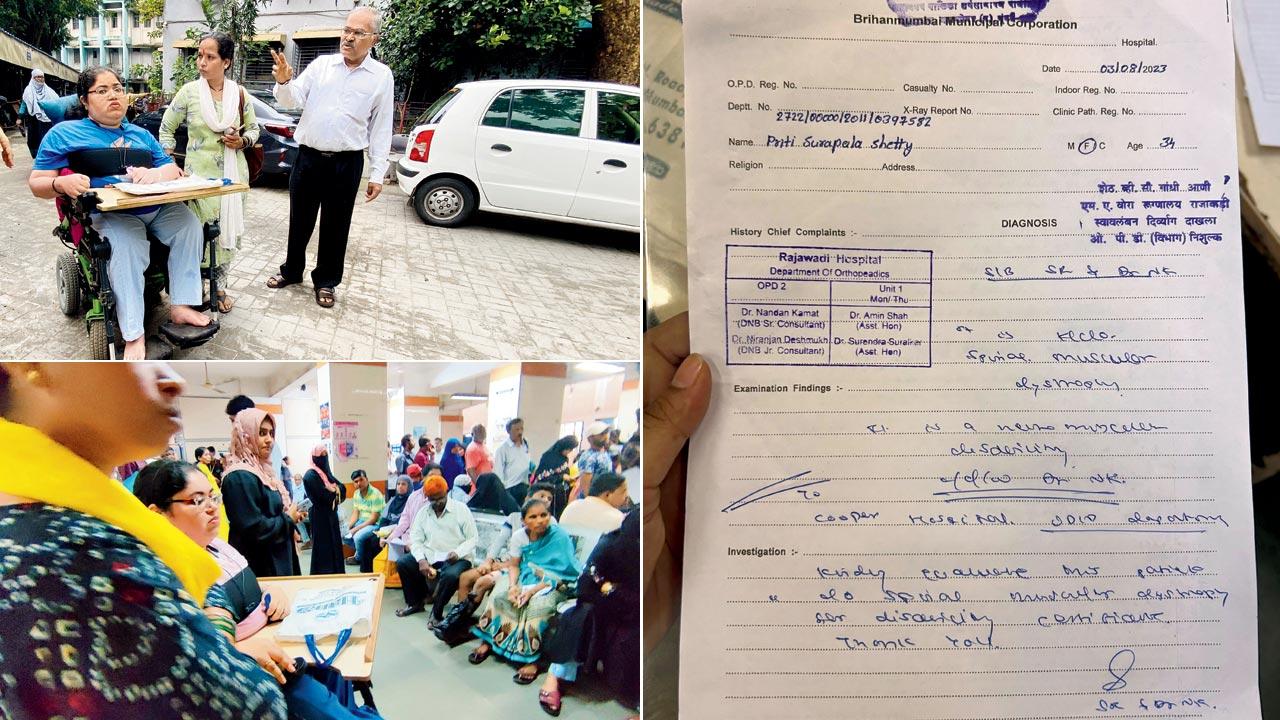Eight years after the government directive making the Unique Disability ID mandatory, municipal hospitals and the UDID portal don’t know how to systemize the shift from disability certificates

Canine behaviourist and disability activist Karan Shah applied for UDID in 2018 and restarted the process six months ago since he wants to take admission at RA Podar College. The official website shows his papers are still being processed. He was diagnosed with Spinal Muscular Atrophy Type III with 60 per cent progressive and permanent disability. He has made five trips to JJ Hospital in just the last two weeks. He travels in a modified vehicle from his Dadar residence and must desist from using the hospital’s rest room which cannot accommodate a wheelchair. Pics/Shadab Khan
The lady at kiosk No. 32 points out that Priti Shetty’s father’s name, functioning as the default middle name, is spelt differently on her disability certificate than on her Aadhaar card. We stop breathing for a moment. In the multiverse of Indian bureaucracy, the shift of a comma can send you down another leg in the trousers of time.
ADVERTISEMENT
We are at Rajawadi Municipal Hospital in Ghatkopar (officially known as Seth VC Gandhi & MA Vora Municipal General Hospital), at the first step towards getting Shetty’s UDID. The 37-year-old digital marketer has completed the online formalities to get her Unique Disability ID (UDID)—which is the government initiative to replace the disability certificate—and is now at the municipal hospital closest to her residence to complete the formalities. Bureaucracy is a maze of hell for all of us, but for the diyvang, there are added obstacles, and calling them by any other name does not line the path with roses.
The UDID, like the disability certificate before it, is verified proof by a government appointed doctor that details the citizen’s affliction and disability percentage (mobility, ability to carry out tasks of personal hygiene, cognition, speech are some of the parameters assessed). Among its benefits are avoiding the ignominy of being taken off a wheelchair during security checks (to test veracity of the disability claim) at airports and consulates, and avail of benefits such as reservation in jobs and college seats. In March this year, the government made the UDID mandatory from April 1 to avail benefits under 17 government schemes that include scholarships, and Nirmaya Health Insurance Scheme.
 Filmmaker and writer Rustom Irani, who suffers from spinal muscular atrophy, undertook the task of getting a UDID in 2019 and remembers being shunted from the Worli Disability Centre to Copper Hospital, Juhu, although he lives in Andheri. Pic/Aishwarya Deodhar
Filmmaker and writer Rustom Irani, who suffers from spinal muscular atrophy, undertook the task of getting a UDID in 2019 and remembers being shunted from the Worli Disability Centre to Copper Hospital, Juhu, although he lives in Andheri. Pic/Aishwarya Deodhar
However, the machinery to make this possible is not only poorly lubricated, many parts are missing and the city’s pav-bhaji stalls are better manned, managed and informed.
Karan Shah applied for his UDID in 2018, and then forgot about it until around six months ago because he wanted to take admission at RA Podar College. A glance at his status of his application on the UDID website showed that his papers were still being processed. Chatter in the disabled community directed him to a BMC hospital. He chose JJ Hospital since that’s where his first assessment as a child was done in 2001: He was diagnosed with Spinal Muscular Atrophy Type III with 60 per cent progressive and permanent disability. That’s where his disability certificate was issued.
Then followed multiple visits: Most staffers were not able to direct him to the designated UDID room—it was confused for the room handling the NEET exam. When mid-day accompanied him on one visit, it was the hygiene staff that told him about Gate No. 9. On July 17, he did the first round of submitted photocopies of required documents (Aadhaar, PAN, and Disability Certificate) there at 2 pm, and was told to return on assessment days: Tuesday or Friday at Room No. 3, between 9 am and 12 pm.

The next day, he showed up at 9 am and waited until a staffer arrived at 10 am, only to be redirected to room No. 4 in the OPD; where he was told to go to room No. 5. He was assessed by an occupational therapist who asked basic questions about the range of his movements and the tasks he could undertake independently, and wrote the assessment on a sheet of paper. He was asked to produce an X-Ray to “prove” his disability.
Then it was back to room No. 3 at Gate 6, where he was told to photocopy all the documents—including the fresh assessment sheet—and give it to them. It was 11.04 am when he got back, and the staffer was replaced by another doctor who said the allotted time was over: Shah would have to return once more the next day just to submit the documents.
On the July 19, he was asked to “come tomorrow” again. Karan, 25, returned with his father, Sunil on the 20th, who brow beat them into taking the papers.
Exhausted just reading this?
To make these trips, Karan has to check the availability of his modified vehicle, which he rents out to other wheelchair-bound people. Long hours from one room to the other cannot be relieved with a stop to answer nature’s call: The bathroom doors at the hospital are not wide enough to allow wheelchairs.
Subsequent trips to JJ Hospital have resulted in the same game of passing the parcel: “Come on Wednesday or Saturday when Dr Abhinav or Dr Abhay is there.” “The allotted days are Tuesday and Friday, come then.” The UDID website still shows “Assessment Pending”, but the Shahs were told that they would receive the number in a couple of weeks.
The UDID website clearly states: Applicants who do not have a Disability Certificate will receive an SMS with date and time to visit the nearest CMO office for assessment. Ideally, the replacing of the disability certificate with an ID should be a streamlined online process.
Filmmaker and writer Rustom Irani had a similar experience in April 2019, when he undertook the task of getting a UDID after the government rule was passed in 2015. “After receiving only a confirmation [of document submission on the UDID website] but no further progress, three months later, I took my application printout to Haji Ali hospital where my Disability Certificate was issued in 1993,” says the 43-year-old. “They said since I lived in Andheri, I should go to Cooper Hospital.”
He was directed to the office of the Disability Certification Doctor only to find that it was open only on Wednesdays, 9 am to 11 am. He was directed from the physiotherapy department to the neurosurgery department (Cooper had no visiting neurologist then) and to a general MD for final notarisation over two weeks. “Then I had to wait for three months for the physiotherapy assessment, and two more weeks for all the other assessment and verification,” he says, humour mostly intact because he has lived with this apathy for most of his life. About nine months later, the card came by mail.
As in the case of Karan and Shetty, Irani’s Disability Certificate clearly states that his disability is permanent and progressive—it’s spinal muscular atrophy with 80 per cent plus disability. Ideally, this should remove the need for any reassessment.
But instead, we are creating lines of disadvantaged people, burdening an already doubled-over medical system in a country that helps the world go digital
Priti Shetty’s story so far
On her first visit to Rajawadi Hospital, the admin staff at Kiosk No. 32 near the main gate, verified all of Shetty’s papers—Aadhaar, Disability Certificate and PAN card—and instructed her to come the next day between 8.30 am and 9.30 am.
 Digital marketer and Mulund resident Priti Shetty with her father and help at Ghatkopar’s Rajawadi Hospital last week, when she had to make two consecutive trips. She anticipates she will need to visit twice more. The family has a modified car with a ramp, and seats removed. It straps down, but not securely, so that the drive is gentle and she doesn’t bounce about and slide in her wheelchair; her disability doesn’t allow her spinal cord and muscles to hold her up. Because Rajawadi didn’t have a neurologist, she was sent off with a letter to Cooper Hospital for an assessment. Pics/Shadab Khan and Sameer Markande
Digital marketer and Mulund resident Priti Shetty with her father and help at Ghatkopar’s Rajawadi Hospital last week, when she had to make two consecutive trips. She anticipates she will need to visit twice more. The family has a modified car with a ramp, and seats removed. It straps down, but not securely, so that the drive is gentle and she doesn’t bounce about and slide in her wheelchair; her disability doesn’t allow her spinal cord and muscles to hold her up. Because Rajawadi didn’t have a neurologist, she was sent off with a letter to Cooper Hospital for an assessment. Pics/Shadab Khan and Sameer Markande
When she arrived there last Thursday, after fighting 45 minutes of traffic to reach 15 minutes before the cut-off time, she was given a form at Kiosk 32 and directed to the orthopaedic ward in OPD 2. There was an expected serpentine line, but the disabled are given preference and she was number three on the list. A 15-minute wait later, she and this writer found ourselves in front of the attending doctor. He looked at her certificate, and asked whether she had any medical documents—X-Rays, etc—from her last assessment by a doctor. “The website didn’t say I needed to bring them,” she said. “You need to be assessed by a neurologist,” said Dr Nandan Kamat, the senior consultant at OPD 2, “And we don’t have one here. I’m writing you a letter; take it to [Dr Rustom Narsi] Cooper [Municipal] Hospital and they will assess you.” We went back to Kiosk 32, where we are instructed to get a photocopy of this letter for ourselves; the original is kept in the hospital’s records.
Priti had already been late to work for two consecutive days, and lives in Mulund; Cooper is in Juhu. She will not only have to take more time off from office, it will have to be co-ordinated with her father, and with the special car which her brother, who suffers from the same genetic condition, also uses.
The family has their own modified car with a ramp for the wheelchair, and seats removed to make space for it. It straps down, but not securely, so that the drive is gentle and she doesn’t bounce about and slide in her wheelchair; her disability takes away the ability for her spinal cord and muscles to hold her up.
And yet, the car is a luxury. For those without it, they would need to hire a special one for at least a few hours, the cost for which starts at Rs 2,000. Uber, Ola, if you are reading, here’s something to add to your fleet.
The trip to Cooper, most likely, won’t be a one-shot job. We strategise that perhaps her father should go first to take the appointment and make the case papers, and she can go later on the allotted day.
Though fairly smoother than the procedure that others such as Shah and Irani had to undergo, Shetty’s experience was riddled with thoughtless ignominies: The aisle leading up to Kiosk 32—which is dedicated to process the papers of those who are disabled—is about 15-feet wide. But there is a bar right across its mouth, with a 3-4 feet gap on each side which wheelchairs have to squeeze through. The window to the kiosk is so high that a person in the wheelchair cannot speak to the administration staff themselves. It needs someone of more than average Indian height (of either sex) to be at eye-level, forget to slip in the required documents. The hospital is accessible by wheelchair, but only because it has to be accessible to stretchers. “I hope they don’t ask me to get out of the chair,” is Shetty’s worry. “I can’t do it without support; they will need a patient-lifting hoist. It’s a new piece of medical equipment, not all hospitals have it.”
mid-day recommends: What the govt should do
The UDID process can be simplified simply by replicating the model followed for COVID-19 vaccinations or by foreign consulates for visa interviews. After inputing relevant information on the UDID website, offer appointment slots at the relevant government hospital with the relevant doctor. Most times, the candidates are shunted about because the hospital did not have the required specialist, or the right kind wasn’t on duty
The first form that is allotted to the candidate on the first visit can be sent electronically via mail or WhatsApp, along with the application receipt
Outline the process they will need to follow at the hospital: Processing of papers, which ideally should be done online, the room to go to, then back to the first desk to turn in any originals after taking a Xerox copy
Hospitals should allot rota of specialists concerned to be at the UDID room at the hospital. It could look something like this: Monday: Neurologists from 8 am to 10 am, Occupational therapist from 11 am to 1 pm, Physiotherapist from 3 pm to 5 pm, etc
The relevant information should be made available to the concerned doctor at the time of examination. There’s an application number: Feed it in to see all the required medical papers
The doctor conducts the assessment, stamps approval, and the candidate receives her UDID card by registered mail as we do the Aadhaar and PAN
 Subscribe today by clicking the link and stay updated with the latest news!" Click here!
Subscribe today by clicking the link and stay updated with the latest news!" Click here!







